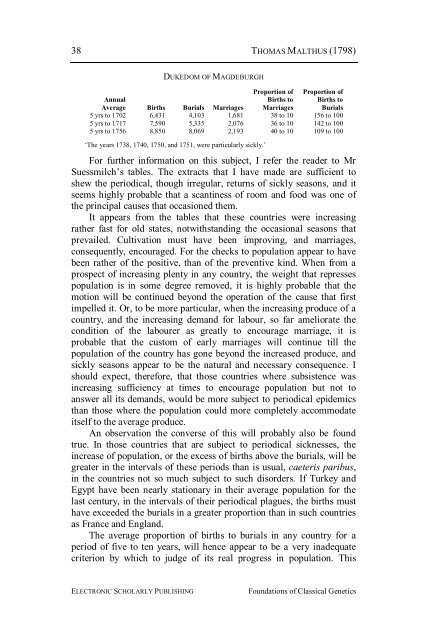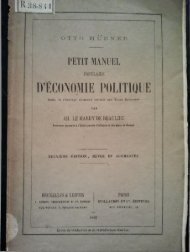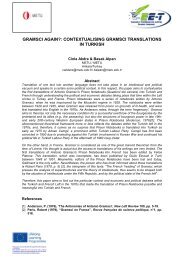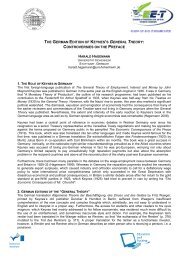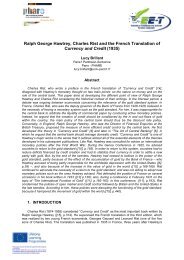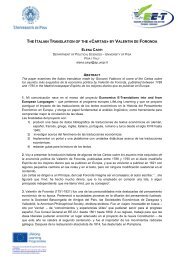Malthus, Thomas, Robert, An Essay on the Principle of Population ...
Malthus, Thomas, Robert, An Essay on the Principle of Population ...
Malthus, Thomas, Robert, An Essay on the Principle of Population ...
You also want an ePaper? Increase the reach of your titles
YUMPU automatically turns print PDFs into web optimized ePapers that Google loves.
38 THOMAS MALTHUS (1798)<br />
DUKEDOM OF MAGDEBURGH<br />
Proporti<strong>on</strong> <strong>of</strong><br />
Births to<br />
Marriages<br />
Proporti<strong>on</strong> <strong>of</strong><br />
Births to<br />
Burials<br />
<str<strong>on</strong>g>An</str<strong>on</strong>g>nual<br />
Average Births Burials Marriages<br />
5 yrs to 1702 6,431 4,103 1,681 38 to 10 156 to 100<br />
5 yrs to 1717 7,590 5,335 2,076 36 to 10 142 to 100<br />
5 yrs to 1756 8,850 8,069 2,193 40 to 10 109 to 100<br />
‘The years 1738, 1740, 1750, and 1751, were particularly sickly.’<br />
For fur<strong>the</strong>r informati<strong>on</strong> <strong>on</strong> this subject, I refer <strong>the</strong> reader to Mr<br />
Suessmilch’s tables. The extracts that I have made are sufficient to<br />
shew <strong>the</strong> periodical, though irregular, returns <strong>of</strong> sickly seas<strong>on</strong>s, and it<br />
seems highly probable that a scantiness <strong>of</strong> room and food was <strong>on</strong>e <strong>of</strong><br />
<strong>the</strong> principal causes that occasi<strong>on</strong>ed <strong>the</strong>m.<br />
It appears from <strong>the</strong> tables that <strong>the</strong>se countries were increasing<br />
ra<strong>the</strong>r fast for old states, notwithstanding <strong>the</strong> occasi<strong>on</strong>al seas<strong>on</strong>s that<br />
prevailed. Cultivati<strong>on</strong> must have been improving, and marriages,<br />
c<strong>on</strong>sequently, encouraged. For <strong>the</strong> checks to populati<strong>on</strong> appear to have<br />
been ra<strong>the</strong>r <strong>of</strong> <strong>the</strong> positive, than <strong>of</strong> <strong>the</strong> preventive kind. When from a<br />
prospect <strong>of</strong> increasing plenty in any country, <strong>the</strong> weight that represses<br />
populati<strong>on</strong> is in some degree removed, it is highly probable that <strong>the</strong><br />
moti<strong>on</strong> will be c<strong>on</strong>tinued bey<strong>on</strong>d <strong>the</strong> operati<strong>on</strong> <strong>of</strong> <strong>the</strong> cause that first<br />
impelled it. Or, to be more particular, when <strong>the</strong> increasing produce <strong>of</strong> a<br />
country, and <strong>the</strong> increasing demand for labour, so far ameliorate <strong>the</strong><br />
c<strong>on</strong>diti<strong>on</strong> <strong>of</strong> <strong>the</strong> labourer as greatly to encourage marriage, it is<br />
probable that <strong>the</strong> custom <strong>of</strong> early marriages will c<strong>on</strong>tinue till <strong>the</strong><br />
populati<strong>on</strong> <strong>of</strong> <strong>the</strong> country has g<strong>on</strong>e bey<strong>on</strong>d <strong>the</strong> increased produce, and<br />
sickly seas<strong>on</strong>s appear to be <strong>the</strong> natural and necessary c<strong>on</strong>sequence. I<br />
should expect, <strong>the</strong>refore, that those countries where subsistence was<br />
increasing sufficiency at times to encourage populati<strong>on</strong> but not to<br />
answer all its demands, would be more subject to periodical epidemics<br />
than those where <strong>the</strong> populati<strong>on</strong> could more completely accommodate<br />
itself to <strong>the</strong> average produce.<br />
<str<strong>on</strong>g>An</str<strong>on</strong>g> observati<strong>on</strong> <strong>the</strong> c<strong>on</strong>verse <strong>of</strong> this will probably also be found<br />
true. In those countries that are subject to periodical sicknesses, <strong>the</strong><br />
increase <strong>of</strong> populati<strong>on</strong>, or <strong>the</strong> excess <strong>of</strong> births above <strong>the</strong> burials, will be<br />
greater in <strong>the</strong> intervals <strong>of</strong> <strong>the</strong>se periods than is usual, caeteris paribus,<br />
in <strong>the</strong> countries not so much subject to such disorders. If Turkey and<br />
Egypt have been nearly stati<strong>on</strong>ary in <strong>the</strong>ir average populati<strong>on</strong> for <strong>the</strong><br />
last century, in <strong>the</strong> intervals <strong>of</strong> <strong>the</strong>ir periodical plagues, <strong>the</strong> births must<br />
have exceeded <strong>the</strong> burials in a greater proporti<strong>on</strong> than in such countries<br />
as France and England.<br />
The average proporti<strong>on</strong> <strong>of</strong> births to burials in any country for a<br />
period <strong>of</strong> five to ten years, will hence appear to be a very inadequate<br />
criteri<strong>on</strong> by which to judge <strong>of</strong> its real progress in populati<strong>on</strong>. This<br />
ELECTRONIC SCHOLARLY PUBLISHING<br />
Foundati<strong>on</strong>s <strong>of</strong> Classical Genetics


